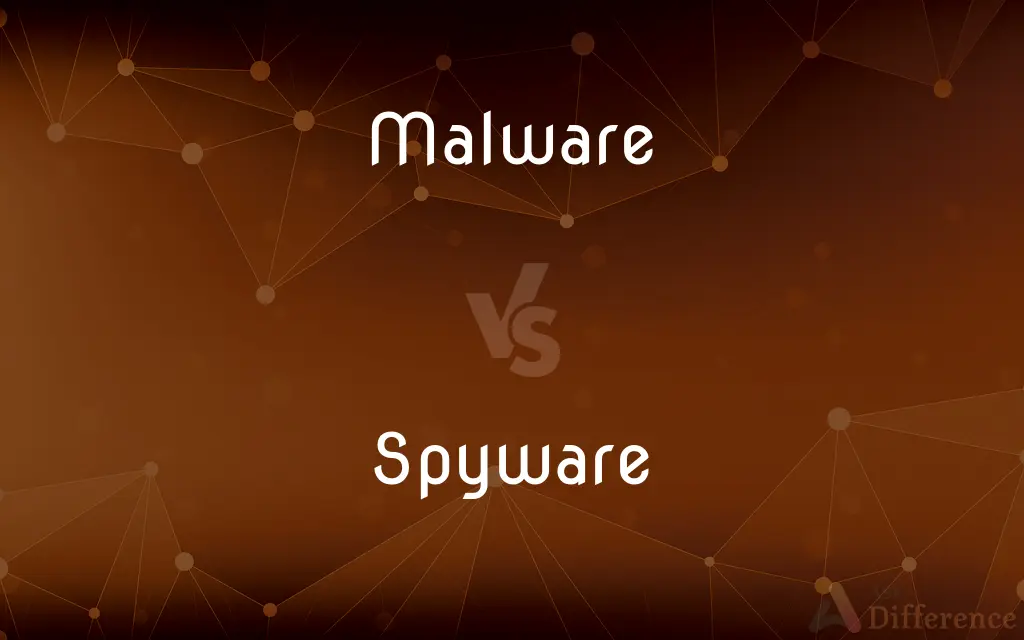Malware vs. Spyware — What's the Difference?
By Urooj Arif & Fiza Rafique — Published on August 22, 2024
Malware is a broad category of malicious software designed to harm or exploit any programmable device or network, whereas spyware is a specific type of malware that secretly observes the user's activities without consent.

Difference Between Malware and Spyware
Table of Contents
ADVERTISEMENT
Key Differences
Malware encompasses a wide range of malicious software, including viruses, worms, trojan horses, ransomware, and spyware, designed to damage, disrupt, or gain unauthorized access to computers and networks. Spyware, on the other hand, specifically focuses on spying on the user's computer activities, such as keystroke logging, browsing history, and personal information, without the user's knowledge or consent.
While malware can cause a variety of damages, from deleting files to encrypting data for ransom, spyware's main intention is to monitor and collect data from users. This information can be used for malicious purposes, such as identity theft or targeted advertising.
Malware is distributed through various methods, including email attachments, software downloads, and compromised websites. Spyware, however, often gets installed alongside legitimate software or through deceptive pop-up ads, making it less noticeable to the user.
Detecting and removing malware requires antivirus and anti-malware tools that scan for a wide range of threats. In contrast, spyware removal might require specialized tools designed to detect and remove spying software specifically.
Malware infections can lead to significant performance degradation, data loss, and system instability. Spyware, while it may not directly damage files or systems, can significantly invade privacy and lead to data breaches.
ADVERTISEMENT
Comparison Chart
Definition
Broad category of harmful software.
Type of malware focused on data espionage.
Primary Intent
Damage, disrupt, or unauthorized access.
Secretly collect and transmit user data.
Distribution
Email, downloads, compromised sites.
Bundled with software, deceptive ads.
Detection Tools
Antivirus, anti-malware.
Specialized anti-spyware, anti-malware.
Impact
System damage, data loss.
Privacy invasion, potential data breaches.
Compare with Definitions
Malware
Viruses, worms, trojan horses, ransomware, spyware.
The virus, a type of malware, spread rapidly through email attachments.
Spyware
Malware that gathers information about a person or organization without their knowledge.
Spyware on his computer tracked every keystroke, compromising his passwords.
Malware
Software designed to disrupt, damage, or gain unauthorized access to a computer system.
The recent malware attack encrypted files demanding a ransom for their release.
Spyware
To monitor and collect data on user's activities and personal information.
The spyware collected data on web browsing habits for targeted advertising.
Malware
Through malicious downloads, email attachments, or compromised websites.
Users accidentally downloaded malware disguised as a software update.
Spyware
Privacy invasion and potential for data breaches.
Spyware transmitted sensitive information to unknown third parties.
Malware
Requires comprehensive antivirus and anti-malware tools.
The anti-malware software successfully removed the detected malware.
Spyware
Often requires specialized anti-spyware tools.
The anti-spyware tool detected and removed the intrusive software.
Malware
To cause harm or exploit systems and networks.
The malware disabled the security system, allowing unauthorized access.
Spyware
Installed via bundled software or through deceptive links.
She unknowingly installed spyware along with a free software download.
Malware
Malicious computer software that interferes with normal computer functions or sends personal data about the user to unauthorized parties over the internet.
Spyware
Software that secretly gathers information about a person or organization.
Malware
(computing) Software which has been designed to operate in a malicious, undesirable manner.
Spyware
Any malicious software that is designed to take partial or full control of a computer's operation without the knowledge of its user.
Spyware
(Internet) Programs that surreptitiously monitor and report the actions of a computer user.
Common Curiosities
What is malware?
Malware is malicious software designed to harm or exploit any programmable device, service, or network.
How can I protect my computer from spyware?
Use reputable anti-spyware and antivirus software, update your system and software regularly, and be cautious with downloads and email attachments.
How does spyware work?
Spyware works by secretly observing the user's computer or internet activities and transmitting that information without their knowledge.
Is all spyware harmful?
While some spyware may be used for relatively harmless purposes like targeted advertising, it is generally considered invasive and potentially harmful due to privacy concerns.
Can malware steal personal information?
Yes, certain types of malware, including spyware, are specifically designed to steal personal information.
Can malware affect mobile devices?
Yes, malware can also target smartphones and tablets, not just computers.
How do I know if my computer is infected with malware?
Signs include system slowdowns, crashes, unexpected pop-ups, and unusual computer behavior.
How often should I scan my computer for spyware?
Regular scans are recommended, at least once a week or more frequently if you download many files.
What is the difference between spyware and a virus?
Spyware secretly collects data, while a virus is a type of malware that replicates itself and spreads to other computers.
Is it safe to use free anti-spyware software?
It can be, but ensure the software is from a reputable source. Some "free" tools may be disguised spyware themselves.
Are antivirus programs effective against spyware?
Many antivirus programs are effective against spyware, but specialized anti-spyware tools may be more thorough.
What should I do if I suspect spyware on my device?
Run a full system scan with a trusted anti-spyware tool and remove any detected threats.
Can updating my operating system protect me from spyware?
Yes, updates often include security patches that can protect against new spyware and malware.
Share Your Discovery

Previous Comparison
Ethylene vs. Ethylidene
Next Comparison
Plush Mattress vs. Pillow Top MattressAuthor Spotlight
Written by
Urooj ArifUrooj is a skilled content writer at Ask Difference, known for her exceptional ability to simplify complex topics into engaging and informative content. With a passion for research and a flair for clear, concise writing, she consistently delivers articles that resonate with our diverse audience.
Co-written by
Fiza RafiqueFiza Rafique is a skilled content writer at AskDifference.com, where she meticulously refines and enhances written pieces. Drawing from her vast editorial expertise, Fiza ensures clarity, accuracy, and precision in every article. Passionate about language, she continually seeks to elevate the quality of content for readers worldwide.













































